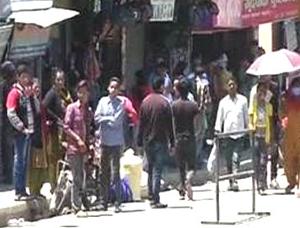Nepal limps back to normalcy
Wed 06 May 2015

Kathmandu: Quake-hit Nepal was limping back to normalcy on Tuesday as a number of markets across the capital and rural areas opened for business, eleven days after a 7.9-magnitude temblor left a trail of death and destruction in the Himalayan nation.
However, schools and educational institutions are expected to remain closed for another few weeks as Nepal recovers from the shock of the earthquake that claimed more than 7,600 lives and reduced over two lakh homes to rubble.
The roads of Kathmandu, which witnessed thin traffic barring, rolling down of trucks carrying relief material and rescue personnel, were abuzz with activity as people thronged market places. “I have opened my shop for the first time since April 25 when the quake hit,” Manoj Shreshta, who runs a garment shop in the city’s Gaushala area, near the iconic Pashupatinath Temple.
“I did not have the heart to open the shop as first few days large number of dead bodies was brought to the cremation ground next to the Pashupatinath Temple,” he said. After initial hiccups, the Nepal Government too had succeeded in streamlining the patchy relief efforts which had earned it the ire of the locals.
NGOs and aid agencies engaged in rehabilitation work across the affected areas too appeared satisfied with the easing of procedural
matters in distribution of relief material.
matters in distribution of relief material.
“A team of four senior government officials have been set up in every district to coordinate relief activities with NGOs and others. The responsiveness of the system has increased over the past three days,” Aditya Insaan, who is associated with the Shah Satnamji Green Welfare Force, told Deccan Herald, at Devighat in Nuwakot district, about 100 kilometres from Kathmandu.
Fears of outbreak of an epidemic have put Nepal authorities on an alert. Sale of meat has been banned in the country to prevent disease outbreaks.
The government has also mounted a massive outreach programme on radio and other communication channels on the relief measures taken by them in the aftermath of the quake.
Announcements were being made on radio repeatedly on the amount of compensation declared by the government and ways to avail the same . The National Emergency Operations Centre, which has been making extensive use of social media to disseminate information, has been tweeting details of foreign nationals found dead or in an injured conditions and hospitals where they can be reached.
Prime Minister Sushil Koirala too, has started visiting relief camps every day to review the relief and rehabilitations measures being carried out.
No Comments For This Post, Be first to write a Comment.
Most viewed from Specials
Most viewed from World
AIMIM News
Latest Urdu News
Most Viewed
May 26, 2020
Do you think Canada-India relations will improve under New PM Mark Carney?
Latest Videos View All
Like Us
Home
About Us
Advertise With Us
All Polls
Epaper Archives
Privacy Policy
Contact Us
Download Etemaad App
© 2025 Etemaad Daily News, All Rights Reserved.






















.jpg)
.jpg)
.jpg)

















